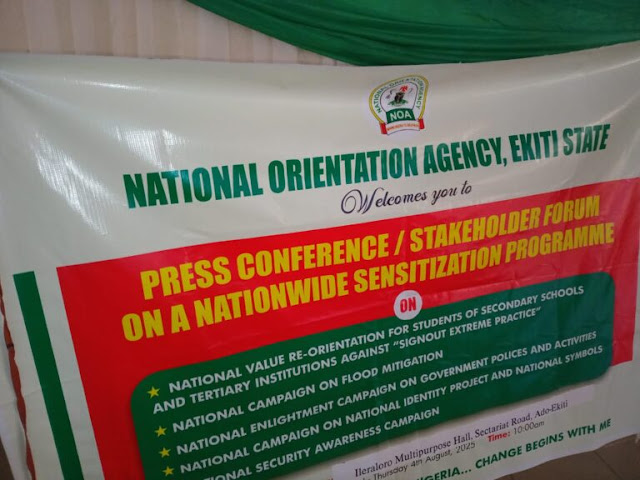In a move that has sparked widespread debate across Ekiti State and beyond, the National Orientation Agency (NOA) has called for a ban on the popular “sign-out” parties organized by students in secondary and tertiary institutions to celebrate their graduation. These events, characterized by extravagant displays, public celebrations, and sometimes reckless behavior, have become a staple of academic milestones in Nigeria. However, the NOA argues that these activities have veered into dangerous territory, promoting indiscipline, immorality, and safety risks. The agency has formally appealed to the Ekiti State Government and educational authorities to outlaw these celebrations, citing their negative impact on students and society at large.
This development has ignited conversations about the balance between cultural expression, student freedom, and the need for regulation in Nigeria’s educational system. While some stakeholders view the proposed ban as a necessary step to curb excesses, others argue it infringes on students’ rights to celebrate their achievements. This article delves into the NOA’s rationale, the nature of sign-out parties, the broader implications of the proposed ban, and the perspectives of various stakeholders in Ekiti and Nigeria as a whole.
The NOA’s Position and Rationale
The NOA, Nigeria’s foremost agency tasked with promoting national values, ethics, and social orientation, has raised alarm over the growing trend of graduation sign-out parties in Ekiti schools. According to the agency, these celebrations, which typically involve students parading in white shirts adorned with signatures, engaging in public displays of merriment, and sometimes hiring vehicles for convoys, have become a breeding ground for moral decadence and safety hazards. The NOA’s Director-General in Ekiti State, Mr. Adebayo Alao, emphasized that these events often lead to behaviors that contradict the values of discipline, modesty, and responsibility that the agency seeks to instill in young Nigerians.
In a formal statement addressed to the Ekiti State Ministry of Education, the NOA outlined several concerns. Firstly, the agency highlighted the financial burden these parties place on students and their families. Many students, particularly those from low-income households, feel pressured to participate in elaborate celebrations to avoid social stigma, often resorting to borrowing money or engaging in questionable activities to fund their participation. This, the NOA argues, promotes a culture of materialism and financial irresponsibility among young people.
Secondly, the NOA pointed to the safety risks associated with sign-out parties. Reports of accidents during celebratory convoys, where students ride in open vehicles or engage in reckless driving, have raised concerns. In some instances, these events have led to injuries or fatalities, prompting authorities to question their safety. Additionally, the NOA noted that sign-out parties often involve alcohol consumption, indecent dressing, and other behaviors deemed inappropriate, particularly in public spaces.
Thirdly, the agency expressed concern about the impact of these events on the academic environment. Schools, meant to be centers of learning and character development, are increasingly becoming venues for ostentatious displays that distract from the core mission of education. The NOA argues that banning sign-out parties would refocus students’ attention on academic excellence and personal growth, rather than superficial celebrations.
The Nature of Sign-Out Parties in Nigeria
To understand the NOA’s concerns, it is essential to examine the nature of sign-out parties in Nigeria. These celebrations have become a cultural phenomenon among students, particularly in secondary schools and tertiary institutions. The term “sign-out” refers to the symbolic act of students signing their names or messages on each other’s white shirts, typically worn on the last day of final examinations. This tradition, which originated as a simple gesture to mark the completion of an academic program, has evolved into elaborate events involving music, dancing, convoys, and public displays.
In Ekiti, as in other parts of Nigeria, sign-out parties have taken on a life of their own. Students often organize processions through major streets, accompanied by loud music, dancing, and sometimes the spraying of money or other items. These events are frequently documented on social media, with students showcasing their outfits, vehicles, and celebratory activities. For many, the sign-out party is a rite of passage, a moment to revel in the joy of completing a significant academic milestone.
However, the evolution of these celebrations has not been without controversy. What was once a modest tradition has, in many cases, become a platform for extravagance and excess. Students compete to outdo one another with lavish displays, including hiring luxury vehicles, hosting parties at expensive venues, and engaging in behaviors that draw public scrutiny. In some instances, sign-out parties have been linked to cultism, drug use, and other vices, further fueling the NOA’s call for a ban.
The Case for a Ban: Safety and Moral Concerns
The NOA’s push for a ban on sign-out parties is grounded in several compelling arguments, particularly those related to safety and morality. One of the most pressing concerns is the risk of accidents during celebratory convoys. In recent years, Nigeria has recorded several incidents of students sustaining injuries or losing their lives during such events. For example, reckless driving, overcrowding in vehicles, and the use of alcohol have contributed to road accidents, some of which have had tragic consequences. In Ekiti, a state known for its relatively peaceful environment, authorities are keen to prevent such incidents from tarnishing its reputation.
Beyond safety, the NOA argues that sign-out parties promote values that are at odds with Nigeria’s cultural and moral fabric. The agency points to instances of indecent dressing, excessive spending, and behaviors that undermine the principles of modesty and humility. For instance, female students wearing revealing outfits or male students engaging in ostentatious displays of wealth have drawn criticism from community leaders and religious groups. In a country where traditional values hold significant sway, such behaviors are seen as a deviation from acceptable norms.
Moreover, the NOA contends that these celebrations contribute to a culture of peer pressure and materialism. Students who cannot afford to participate in elaborate sign-out parties may feel marginalized or inferior, leading to psychological stress and, in some cases, involvement in illicit activities to raise funds. By banning these events, the NOA believes schools can foster a more inclusive environment where academic achievement, rather than financial status, is celebrated.
Stakeholder Reactions: Support and Opposition
The NOA’s proposal has elicited a range of reactions from stakeholders in Ekiti’s education sector and beyond. Supporters of the ban, including some school administrators and parents, argue that it is a necessary step to restore order and focus in schools. Mr. Olusegun Adebayo, a principal at a public secondary school in Ado-Ekiti, welcomed the NOA’s initiative, stating that sign-out parties have become a distraction from the core objectives of education. “These celebrations have gone beyond what is reasonable,” he said. “Students are more focused on planning parties than preparing for their future careers. A ban would help refocus their priorities.”
Parents, particularly those from conservative backgrounds, have also expressed support for the proposed ban. Mrs. Funmilayo Ojo, a mother of two secondary school students, noted that the pressure to fund extravagant sign-out parties places a significant burden on families. “Many of us struggle to pay school fees, yet our children are expected to spend thousands of naira on clothes, food, and transportation for these parties,” she said. “It’s a relief to know that the government is considering putting an end to this.”
However, not all stakeholders are in favor of the ban. Students, in particular, have voiced strong opposition, arguing that sign-out parties are a legitimate way to celebrate their hard-earned academic achievements. Miss Tolu Adeyemi, a final-year student at Ekiti State University, described the proposed ban as an overreach by the authorities. “After years of studying and facing challenges, we deserve to celebrate our success,” she said. “Sign-out parties are a tradition that brings joy and unity among students. Banning them feels like punishing us for expressing ourselves.”
Some educators also question the feasibility and fairness of the ban. Dr. Gbenga Afolabi, a lecturer at a private polytechnic in Ekiti, argued that rather than an outright ban, authorities should focus on regulating sign-out parties to ensure they are conducted safely and responsibly. “A blanket ban might push these celebrations underground, where they could become even more dangerous,” he cautioned. “Instead, schools could work with students to set guidelines for acceptable behavior during these events.”
Broader Implications for Ekiti and Nigeria
The NOA’s call for a ban on sign-out parties in Ekiti raises broader questions about the role of cultural practices in Nigeria’s education system. While the agency’s intentions are rooted in promoting discipline and safety, the proposal touches on deeper issues of individual freedom, cultural evolution, and the balance between tradition and modernity. Nigeria, like many African nations, is navigating a complex landscape where traditional values coexist with globalized youth culture. Sign-out parties, with their blend of local and Western influences, reflect this tension.
In Ekiti, a state known for its emphasis on education and intellectual achievement, the debate over sign-out parties highlights the challenges of regulating student behavior in a rapidly changing society. The state has long prided itself on producing scholars and professionals who contribute to Nigeria’s development. However, the rise of ostentatious celebrations risks overshadowing these achievements, prompting authorities to take action.
Nationally, the NOA’s proposal could set a precedent for other states to follow. If Ekiti successfully implements a ban on sign-out parties, it may inspire similar measures in Lagos, Oyo, or other regions where these celebrations are prevalent. Conversely, resistance to the ban could fuel a broader movement among students to defend their right to self-expression, potentially leading to clashes with authorities.
Challenges of Enforcement
Even if the Ekiti State Government adopts the NOA’s recommendation, enforcing a ban on sign-out parties poses significant challenges. For one, these celebrations often take place outside school premises, making it difficult for educational authorities to monitor or control them. Students may organize private events at homes, event centers, or public spaces, rendering the ban ineffective unless accompanied by robust enforcement mechanisms.
Additionally, the popularity of social media complicates enforcement efforts. Platforms like Instagram, TikTok, and X have become key avenues for students to showcase their sign-out parties, amplifying their visibility and appeal. A ban could drive these activities underground, where they may become harder to regulate. Authorities would need to collaborate with law enforcement, community leaders, and parents to ensure compliance, a task that requires significant resources and coordination.
Furthermore, the cultural significance of sign-out parties cannot be ignored. For many students, these events are not just about celebration but also about creating lasting memories with peers. A heavy-handed approach to banning them could alienate young people and erode trust in institutions. The NOA and the Ekiti State Government would need to engage students in dialogue to address their concerns and explore alternative ways to celebrate academic milestones.
Alternatives to a Ban
Rather than an outright ban, some stakeholders have proposed alternative measures to address the concerns raised by the NOA. One suggestion is the introduction of school-sanctioned graduation ceremonies that provide a structured and safe environment for students to celebrate. These events could include speeches, awards, and cultural performances, allowing students to mark their achievements without resorting to extravagant or risky behaviors.
Another approach is to integrate character education into the school curriculum, emphasizing the values of modesty, responsibility, and community service. By fostering a culture of discipline and ethical behavior, schools could reduce the appeal of ostentatious sign-out parties and encourage students to celebrate in more meaningful ways.
Additionally, authorities could work with student unions and organizations to establish guidelines for sign-out parties. These guidelines could include restrictions on alcohol consumption, convoy activities, and public displays that disrupt traffic or community peace. By involving students in the decision-making process, schools can promote a sense of ownership and responsibility, reducing the likelihood of defiance.
The Role of the NOA in Shaping National Values
The NOA’s push for a ban on sign-out parties underscores its broader mandate to promote positive values and behaviors among Nigerians. Established to foster national unity and ethical conduct, the agency has a history of addressing social issues that impact the country’s moral and cultural landscape. From campaigns against corruption to initiatives promoting patriotism, the NOA plays a critical role in shaping Nigeria’s social fabric.
In the context of sign-out parties, the NOA’s intervention reflects its commitment to safeguarding the youth from influences that could derail their personal and academic development. However, the agency must balance its regulatory efforts with respect for individual freedoms and cultural diversity. Engaging with students, parents, and educators in a constructive dialogue will be key to achieving this balance and ensuring that any measures taken are both effective and widely accepted.
Conclusion
The NOA’s call for a ban on graduation sign-out parties in Ekiti schools has sparked a vital conversation about the role of celebrations in Nigeria’s education system. While the agency’s concerns about safety, morality, and financial pressure are valid, the proposed ban raises questions about enforcement, cultural expression, and the rights of students to celebrate their achievements. As Ekiti navigates this issue, the state has an opportunity to set a model for balancing regulation with freedom, ensuring that students can mark their milestones in ways that are safe, inclusive, and aligned with Nigeria’s values.
The debate over sign-out parties is not just about one state or one tradition; it reflects broader societal questions about how Nigeria’s youth navigate the intersection of tradition, modernity, and personal expression. Whether through a ban, regulation, or alternative approaches, addressing these concerns will require collaboration among all stakeholders—students, parents, educators, and policymakers. As the conversation unfolds, the focus must remain on fostering an environment where academic achievement is celebrated responsibly, ensuring that Nigeria’s future leaders are equipped with the values and skills to thrive in an ever-changing world.






